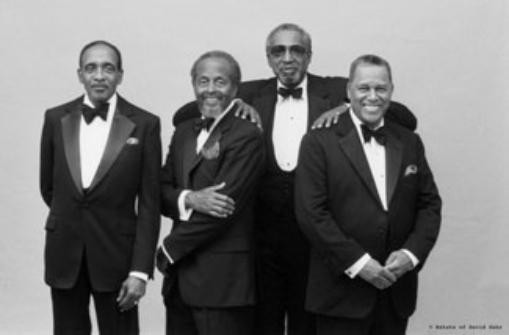
Sewanee, Tenn.—A landmark concert in the history of American music gets long overdue recognition in February. Back in April 1961, eight years before the Woodstock Festival and eight years after Duke Ellington’s last pop hit, the Modern Jazz Quartet was
heard for the first time in the South, performing to a rapt audience at the University of the South in Sewanee, Tennessee. At this point the progressive MJQ was not yet the household name it would become later; it had landed in Sewanee entirely thanks to the efforts of the student Jazz Society. The University, lacking a real concert hall, offered up its gymnasium one Sunday afternoon for a superb concert in the round by the MJQ. That gym, named for a segregationist, hosted hundreds of listeners in one of the first integrated events to occur on campus—or anywhere in that region.
On Sunday afternoon, February 11, 2018, the University of the South pays tribute to that landmark event by hosting another momentous concert, the Aaron Diehl Quartet in performance, reviving the songs played by the MJQ back in ’61. Aaron Diehl, celebrated for his virtuosity as both jazz and classical pianist, brings the outstanding vibraphonist
Warren Wolf along with David Wong, bass, and Peter Van Nostrand, drums—altogether forming an ensemble exceptionally capable of handling the MJQ book.
In the preceding days, February 9 and 10, the University also hosts a symposium dedicated to the music of the MJQ. The symposium assembles several leading names in jazz studies, including Gary Giddins, featured expert in Ken Burns’s "Jazz" and author of Visions of Jazz and Bing Crosby: Swinging on a Star; and George Schuller, drummer with the Lee Konitz Quartet and son of famed composer and jazz advocate Gunther Schuller. Symposium participants will also hear from Phil Schaap, a fabled New York City jazz personality (Curator, Jazz at Lincoln Center, faculty member of Juilliard Jazz Studies, and WKCR jazz host), and Dr. Christopher Coady, the author of John Lewis and the Challenge of “Real” Black Music and lecturer at the Sydney (Australia) Conservatorium of Music. Coady will lecture on the significance of the MJQ’s experience in Europe and the impact of that on their lead songwriter in “Jazz Possibilities: John Lewis at Home and Abroad.” Schaap, regarded as the world’s premier
jazz disk-jockey, will curate listening sessions of MJQ recordings in the acclaimed Ralston Listening Room on the campus of the University of the South. Aaron Diehl, who at an earlier stage of his career was selected by John Lewis’s widow, Mirjana, to archive the music of her husband, also contributes to the symposium with a performance/discussion on Lewis’s charts from a pianist’s perspective.
The MJQ, referred to as the premier concert ensemble in jazz and even “the world’s finest chamber group in any kind of music,” modeled a rare degree of egalitarian, even democratic, cooperation. In the words of John Lewis, the pianist and primary composer, they “tried to make it a reflection of this country, the ideal reflection that it
should be a democracy, where the group takes advantage of the best abilities of each of the participants.” The vibraphonist Milt Jackson gave the group a brilliant soloist, and the drummer Connie Kay and bassist Percy Heath each added personal stylistic elements essential to the mature MJQ sound. The foursome opened jazz to new audiences at the same time that it expanded the art’s frontiers. Some of their recordings apply jazz inspiration to classical forms and textures, heading in the direction sometimes labeled “third stream,” while others venture towards the cool or bop idioms within jazz. In the late ’60s The Beatles brought out two MJQ albums on the Apple label. Together the quartet recorded, performed, and toured longer than virtually all other chamber ensembles—for more than four decades, from the early 1950s to the mid-’90s. The MJQ members died between 1994 and 2005, but the quartet retains its hold on today’s listeners with recordings like “Django” and “Bags Groove”—and continues to attract attention from leading contemporary jazz musicians, notably Wynton Marsalis, Ron Carter, and
Aaron Diehl.
A special attraction of the symposium will be a viewing of Music Inn, hosted by George Schuller, who co-produced the film. This documentary conveys the remarkable story of the School of Jazz in Lenox, Massachusetts, and the superb performers who for three legendary decades graced the stage of its “Music Barn,” including Louis Armstrong, Dave Brubeck, Dizzy Gillespie, and Pete Seeger. All these artists—among many others—also played on the Sewanee campus in the 1960s and ’70s, sponsored by the student Jazz Society. (Among the first of these was the celebrated 1961 MJQ concert.) These performances were especially notable for occurring in what was a still largely segregated South, and it was here that integration was first possible in the region. Not coincidentally, the Highlander Folk School—well known as a training site for nonviolent protest where champions of the civil rights era assembled, including Martin Luther King, Jr., Rosa Parks, and Septima Clark—was just a few miles up the road from Sewanee. Some of the same individuals were active in both the Sewanee Jazz Society and at Highlander. In conjunction with the MJQ symposium, surviving members of the Sewanee Jazz Society will celebrate a reunion on February 8 and 9.

